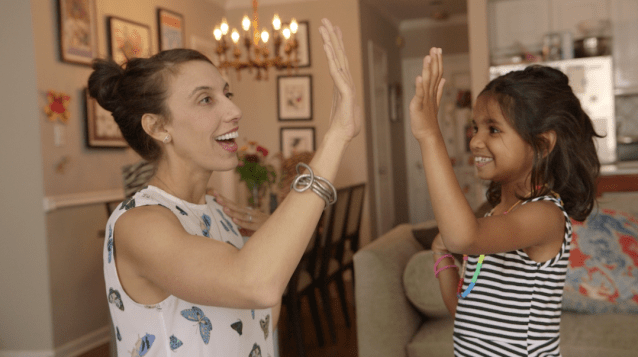
In 1989 my parents made a VHS recording of Into the Woods when the B’way show aired on PBS. That tape must have been made of strong stuff since I probably watched scores of times. I knew all the words, made up secret handshakes with my best friend to the Sondheim lyrics and dressed as Little Red Riding Hood for Halloween for three consecutive years, totally inspired by that show.
But it wasn’t until I became a mom that I understood the “Children Will Listen” song that the Witch sings about her daughter, Rapunzel. When I recently directed a group of kids in the Broadway Jr version, these lyrics cut me to the quick. The kids stood out simply and sang:
Careful the things you say
Children will listen
Careful the things you do
Children will see and learn
Children may not obey, but children will listen
Children will look to you for which way to turn
To learn what to be
Careful before you say “Listen to me”
Sondheim was wise.
“Listening” is one of those words that actors and acting teachers care a great deal about. When we really listen instead of planning what we are going to do on stage or in front of the camera, we can have authentic reactions. Why is it so hard to do this? Possibly because we don’t actually listen enough in our real life?
So what if we take words out of the equation. Can we listen to our kids, without language? Can we create a meaningful and intimate conversation where we are giving and receiving information but no words are exchanged? Where listening is with our body and our heart? Where talking is through gesture and emotion?
I want Nathaniel to know that I hear him – to feel like I get what he is giving me. And in turn, I know that he will listen, like the lyrics say. So what can I give him to listen to that is simple, truthful and filled with love?
Here’s the game for that: Magic Mirror
Mirrors are portals to the fantasy world—as in Lewis Carroll’s Through the Looking Glass. They can also be portentous instruments of information as in Snow White or Beauty and the Beast. It isn’t hard to convince your child to play a Magical Mirror game.
Explain to your child that they get to do whatever they like and the Mirror (you) will follow them. The goal is not to leave the mirror behind so you have to go really slowly – slower than you normally would to do an activity.
Use this as a way to connect with your child when the incessant stream of language is overwhelming, when you hear yourself talking too much or when you just want a new way to bond.
I’d love to hear about your experience playing Magic Mirror—so chime in below and tell us how you did it!











